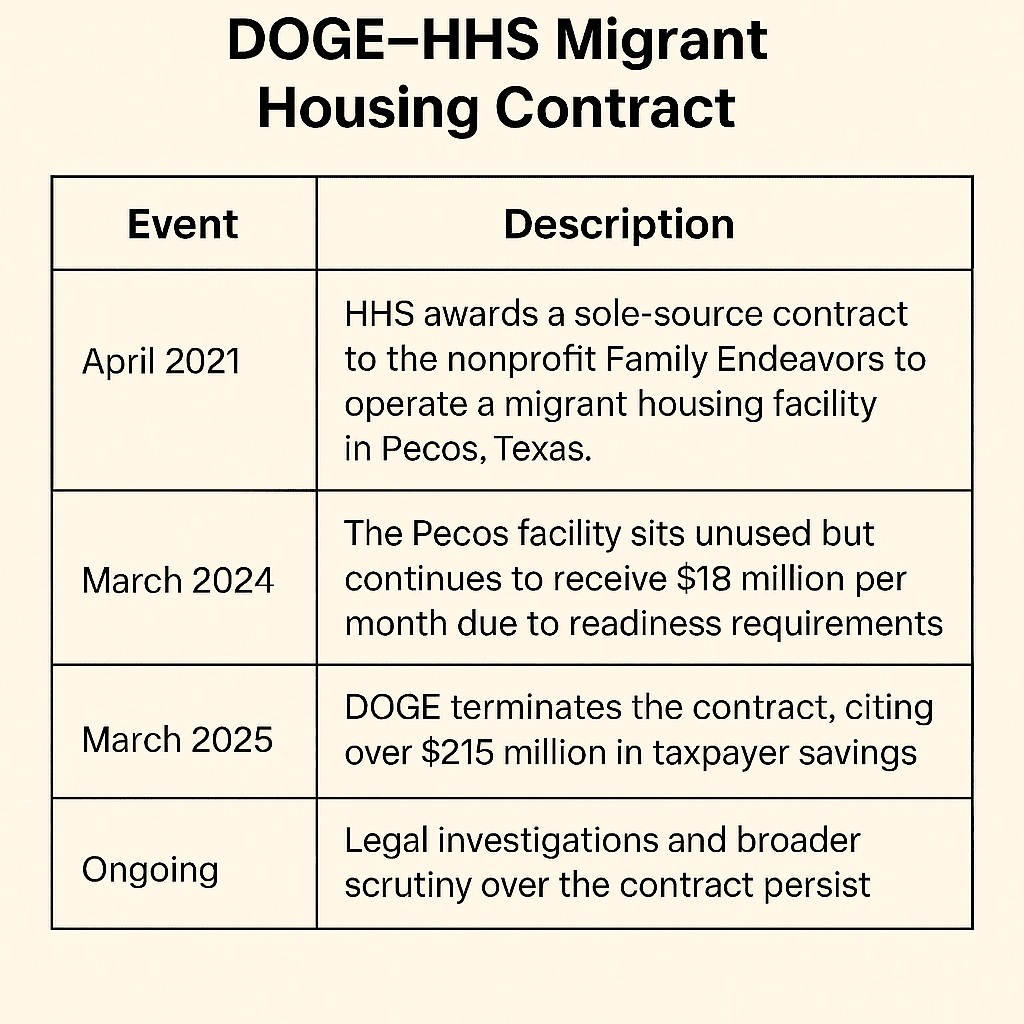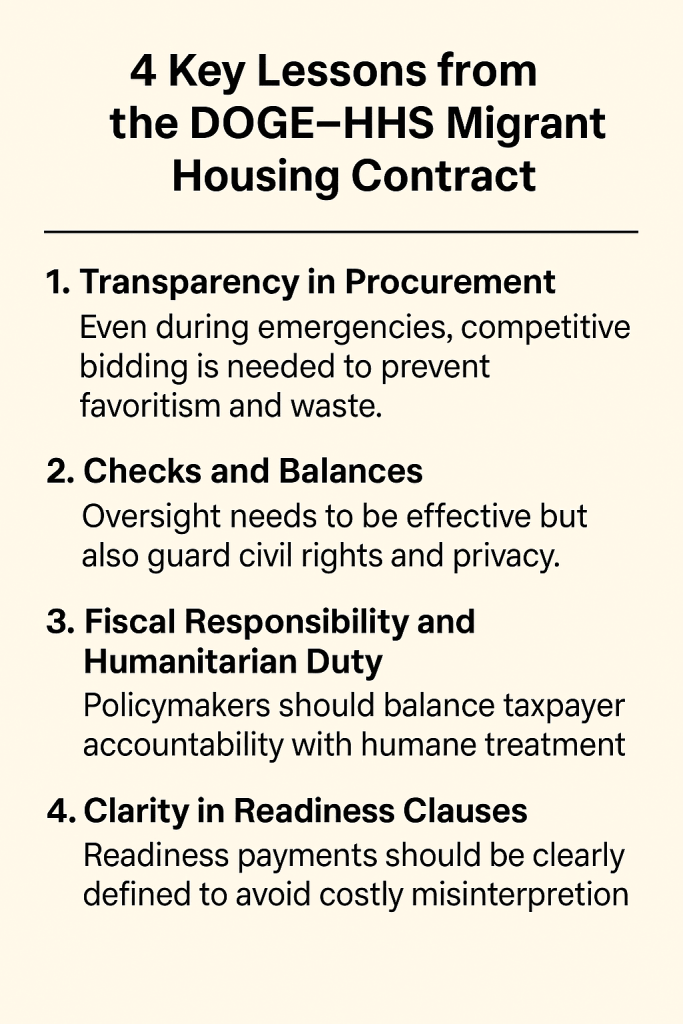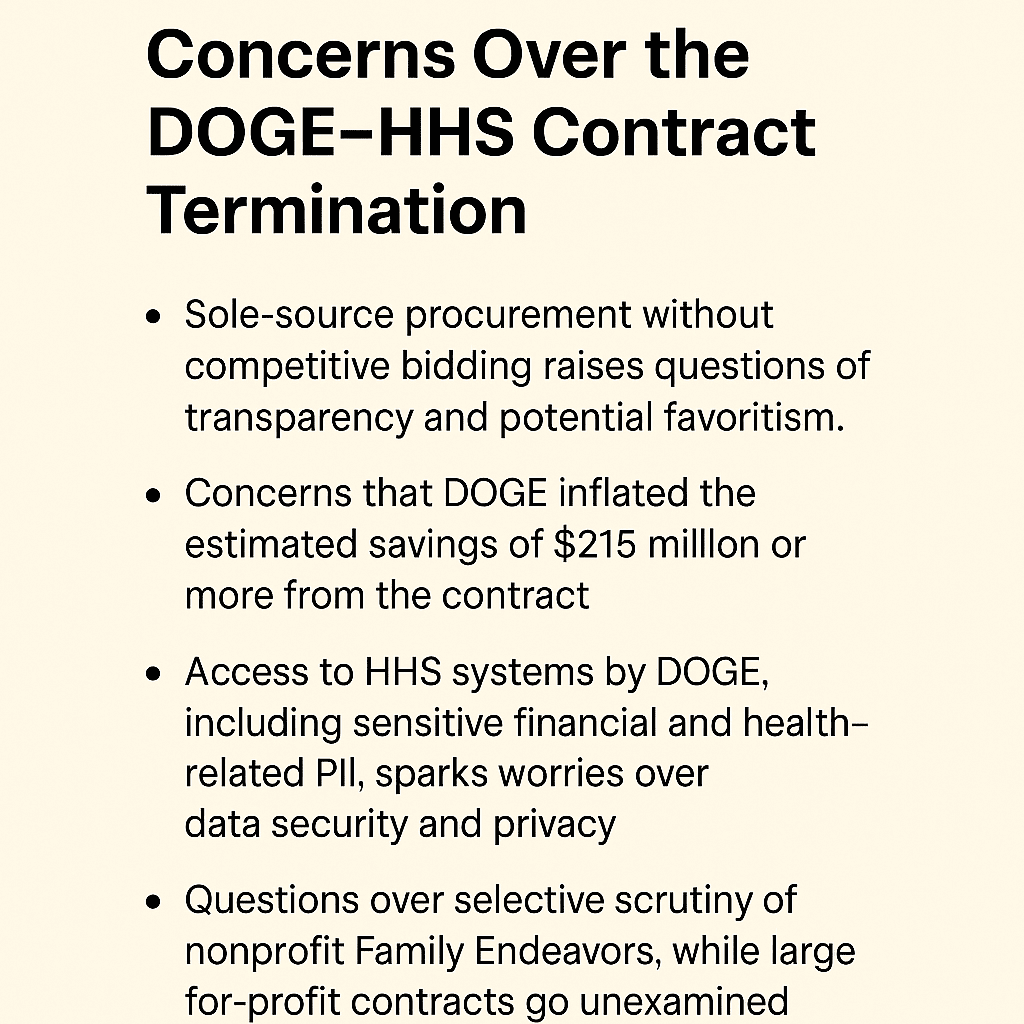Table of Contents
- Introduction. 1
- Background & Context 1
- The Rise of Unaccompanied Minors and Emergency Intake Sites. 1
- Who’s Family Endeavors?. 1
- Scope of the Contract. 2
- Sole-Source Procurement and Insider Connections. 2
- Scandal & Termination. 2
- Empty Facility and Waste Allegations. 2
- DOGE Intervention and Claimed Savings. 3
- Legal Oversight and Investigations. 3
- Broader Implications. 3
- DOGE’s Growing Reach and Data Access. 3
- Questionable Claims of Savings. 3
- Comparative Government Spending. 4
- Stakeholder Perspectives. 4
- DOGE / Defense of Contract Termination. 4
- Family Endeavors’ Response. 4
- Oversight and Watchdog Warnings. 4
VII. Lessons & Policy Takeaways. 4
The DOGE–HHS migrant housing contract stands as one of the most debated examples of federal contracting in recent memory. At its center was a sole-source agreement between the Department of Health and Human Services (HHS) and the nonprofit organization Family Endeavors. Initially designed to address an urgent humanitarian need, the arrangement was terminated in early 2025 by the Department of Government Efficiency (DOGE) amid allegations of waste, poor oversight, and questionable decision-making.
This case is noteworthy because it combines multiple strands of policy concern: immigration management, fiscal accountability, and the limits of emergency authority in public contracting. While the contract was presented as a quick solution to shelter vulnerable children, it ultimately raised deeper questions about governance, ethics, and how the federal government balances speed with accountability.

In 2021, the United States experienced a significant surge in unaccompanied minors arriving at its southern border. This sharp increase in border crossings overwhelmed existing facilities and led to overcrowded detention centers. To respond, HHS established a network of Emergency Intake Sites (EIS). These sites were meant to provide temporary housing, food, and medical care while children awaited placement with family members or sponsors.
However, the speed at which these facilities were created meant that traditional competitive bidding processes were often bypassed. Federal contracts were awarded on a no-bid basis to organizations with the capacity or at least the willingness to scale up quickly. The decision-making process was justified as necessary for public safety and humanitarian reasons, but it planted the seeds for later criticism.

Family Endeavors, a San Antonio–based nonprofit, had a long history of providing community support services, housing programs, and disaster relief operations. It was respected for its role in supporting veterans, the homeless, and individuals recovering from natural disasters. By 2021, however, the nonprofit faced scrutiny for expanding into areas well beyond its core expertise.
Despite these concerns, Family Endeavors was awarded a substantial contract to operate facilities for migrant children. The organization’s mission-driven language emphasized compassion and humanitarian duty, but its sudden rise into multi-hundred-million-dollar contracting created tensions between perception and reality.
The contract focused on managing a large facility in Pecos, Texas, specifically designed for unaccompanied minors. The facility’s operational readiness was mandated regardless of whether children were housed there. This meant millions of dollars flowed monthly, even if beds were empty. Estimates suggested the government was paying nearly $18 million per month to maintain the site.
For policymakers, the justification lay in readiness: it was argued that a sudden surge in border arrivals required a facility that could be activated immediately. Yet in practice, the shelter remained underused, raising difficult questions about the balance between preparedness and fiscal prudence.
Perhaps more controversial than the scope was the process of awarding the contract. It was issued as a sole-source procurement, without the competitive bidding normally required in federal acquisitions. Critics alleged that political and personal ties influenced the decision.
Specifically, a former senior Immigration and Customs Enforcement (ICE) official who had also served on the Biden transition team joined Family Endeavors shortly before the award. This created a perception of conflict of interest, fueling accusations that insider connections had steered federal money toward the nonprofit.
The lack of transparency in procurement weakened public confidence and positioned the contract as a case study in the dangers of expediency overriding established safeguards.
By March 2024, reports emerged that the Pecos facility had not housed children for months, yet taxpayers continued to fund its upkeep. Payments continued under the “readiness” clause, with millions flowing to Family Endeavors even though the facility was idle. Critics framed this as a textbook example of government waste—money spent without delivering measurable outcomes.
The optics were damaging: at a time of strained public trust and budgetary debates, images of empty dormitories contrasted sharply with invoices for tens of millions of dollars.
In early 2025, the Department of Government Efficiency (DOGE) stepped in. Created as part of a broader reform agenda, DOGE was tasked with identifying inefficiencies across federal agencies. After reviewing the contract, DOGE terminated the arrangement, announcing that its decision would save taxpayers more than $215 million annually.
This intervention boosted DOGE’s public profile, positioning it as a watchdog committed to fiscal discipline. The announcement became a political talking point, reinforcing narratives about rooting out wasteful spending.
The contract did not end quietly. Federal prosecutors signaled intent to scrutinize the deal, with U.S. Attorney Ed Martin noting potential irregularities. Questions remained about whether insider ties violated procurement rules and whether the government had adequate oversight mechanisms in place.
The legal investigations ensured that the story would not close with contract termination but would instead continue to shape policy conversations around federal contracting.
DOGE’s role extended beyond contract reviews. Its access to HHS systems included sensitive financial and health-related databases containing personally identifiable information (PII). While supporters applauded this reach as necessary for identifying inefficiencies, critics warned that such sweeping access raised concerns about privacy, mission creep, and the erosion of agency autonomy.
The case highlighted a paradox: efficiency reforms may simultaneously strengthen fiscal accountability and weaken institutional checks on sensitive information.
While DOGE claimed savings in the hundreds of millions, independent assessments suggested the numbers were exaggerated. Some analysts calculated the true figure closer to $126 million, far below the agency’s public estimates. Critics accused DOGE of inflating outcomes to bolster its reputation, a practice dubbed “DOGE-flation” in policy circles.
This discrepancy raised a crucial point: efficiency is not merely about numbers but about credibility. Overstated savings undermine trust, reducing the effectiveness of watchdog reforms.
Another irony emerged when comparing Family Endeavors’ contract with other contractors. For-profit corporations received multi-billion-dollar deals to manage larger migrant facilities, often without significant scrutiny. Critics questioned why DOGE spotlighted a nonprofit while leaving far costlier arrangements relatively untouched.
This selective focus revealed tensions between politics and policy: targeting a nonprofit with limited political influence was easier than confronting entrenched corporate contractors.
From DOGE’s perspective, the termination was proof of its mission to protect taxpayers and enforce efficiency. Officials framed the decision as a demonstration of accountability, arguing that readiness clauses should not justify paying for empty facilities.
Family Endeavors defended its actions, emphasizing its long history of service and its compliance with the terms of the contract. Leaders argued that readiness requirements were imposed by the government and that the organization had fulfilled its obligations. They presented themselves as partners in humanitarian care, not profiteers.
Policy experts and watchdog groups offered mixed reactions. Some praised DOGE for intervening, while others warned that its sweeping tactics risked undermining trust in nonprofit organizations and eroding privacy safeguards. The controversy underscored the need for balanced reform efficiency should not come at the expense of transparency or civil liberties.

VII. Lessons & Policy Takeaways
The DOGE–HHS migrant housing contract provides a cautionary tale about emergency governance. Several key lessons emerge:
- Transparency in Procurement: Even during emergencies, no-bid contracts create risks of favoritism and waste. Competitive processes are essential for maintaining legitimacy.
- Checks and Balances: Oversight mechanisms must be robust enough to prevent waste but also balanced enough to safeguard privacy and civil rights.
- Fiscal Responsibility and Humanitarian Duty: Policymakers must balance taxpayer accountability with humane care for vulnerable populations.
- Clarity in Readiness Clauses: Future contracts should define conditions for readiness payments more precisely to avoid funding idle facilities.
The trajectory of the DOGE–HHS migrant housing contract illustrates the tension between rapid crisis response and long-term accountability. What began as a humanitarian effort evolved into a political scandal marked by accusations of waste, inflated claims, and oversight challenges.
Ultimately, this case underscores the importance of transparency, evidence-based savings claims, and balanced reform. As policymakers grapple with future crises, the lessons of this contract should guide efforts to design policies that are efficient, ethical, and sustainable.